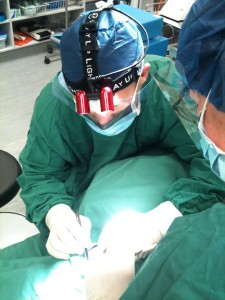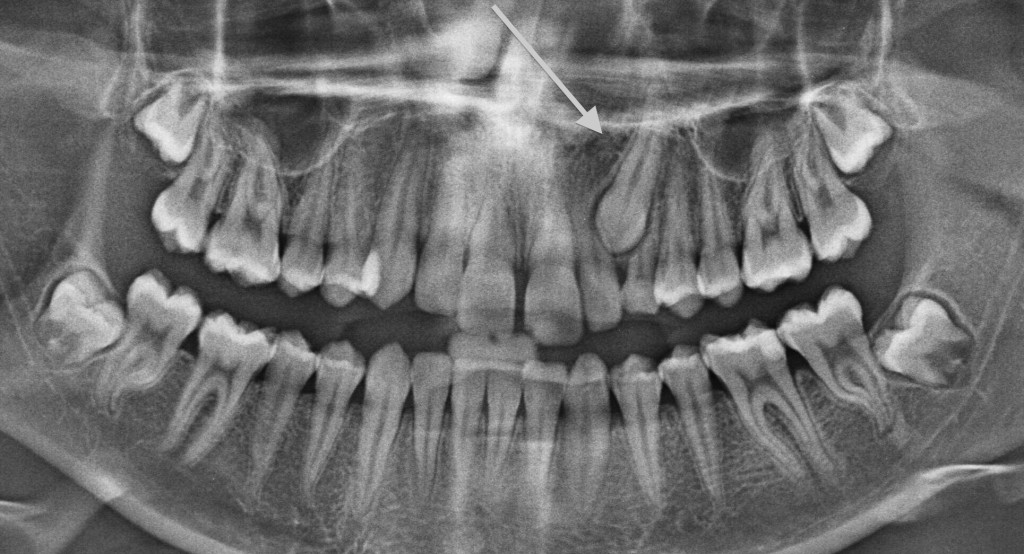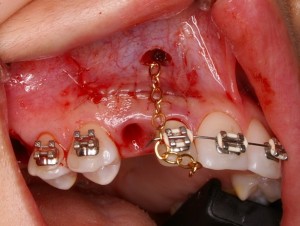Oral Surgery
Oral surgery (dentoaveloar surgery) includes a range of surgical procedures that are conducted in the mouth and jaws. Typically, a Dentist or an Oral and Maxillofacial Surgeon (OMFS) will perform Oral Surgery and this may be completed under either Local Anaesthetic or IV sedation in the chair, or under a General Anaesthetic in hospital.
In a large proportion of cases depending on their level of training and experience many dentists are very competent in and enjoy performing a large range of oral surgical procedures. Often a dentist is able to incorporate oral surgery procedures into a patient’s overall treatment plan without the need for a patient to visit multiple practitioners or be referred elsewhere. This often saves the patient considerable time and money.
The following are a range of surgical procedures that are referred to and conducted at our clinic under either local anaesthetic in the chair, under various forms of sedation, or under a general anaesthetic in hospital.
- Extractions – single, multiple, uncomplicated, and complicated
- Wisdom teeth extractions – uncomplicated and complicated
- Biopsies for pathology screening and removal
- Frenectomy – ankyloglossia (tongue tie) and removal of upper lip frenums
- Apicectomy – removal of infected root tip after root canal treatment
- Pre-prosthetic surgery – multiple teeth extractions, bone modifications, and soft tissue removal prior to denture construction
- Treatment of dental infections
- Implant placement and bone grafting procedures
- Sinus surgery
- Orthodontic exposure of impacted teeth
There are two ways a tooth or teeth can be removed.
1. Under local anaesthetic, oral or intravenous sedation in the chair
2. Under general anaesthetic in hospital
Oral Surgery in the chair
When persons are unable to or it is not desirable to have treatment performed under a general anaesthetic in hospital, it is often very easy to have a procedure performed under local anaesthetic or a combination of sedation techniques in the chair. With well-administered local anaesthetic, for many people oral surgery in the chair is a sound and viable option and should not be a traumatic and frightening experience.
Treatment under conscious sedation with medications, intravenous injections, and / or inhalation (Nitrous Oxide) can be arranged to avoid unnecessary stress for patients who are anxious, fearful, or phobic.
All teeth and nearly all oral surgical procedures are safe to be performed in the chair and this method should always be considered as the first option for most people. Recovery time, days off work, and the cost of treatment is significantly less. In addition, the risks associated with a general anaesthetic whilst small, are still present. This is particularly relevant for the elderly and those with complicated medical conditions where a general anaesthetic may place them at too great a risk of health complications.
When a large number of teeth need to be removed, complicated surgical extractions, or additional surgical procedures after the extractions are required, and fear or certain medical conditions prevent the patient from having a tooth removed under local anaesthetic, then intravenous sedation in the chair, or a general anaesthetic in hospital may be the best method.
Oral Surgery in Hospital
Often it is desirable for the patient to have treatment, or for more complex surgical cases, to be conducted in hospital under a general anaesthetic. Other reasons may be anxiety about the proposed procedure, or the proximity of nerves and blood vessels that require the patient to remain completely stable so that the risk of damage to these structures is minimised.
Admission typically occurs on a day-patient basis at the Hobart Day Surgery, and that is, you have the surgery and go home on the same day. If required, an overnight stay in hospital can also be arranged at the Calvary St John’s Hospital.
What Happens Before My Oral Surgery
When patients are referred to our practice for any oral surgery procedure (unless it is an emergency procedure) typically a 30-minute consultation takes place prior to the actual surgery being performed.
This allows for:
- X-rays to be arranged and reviewed – and any specialty x-rays such as cone beam CT’s may also be ordered if required.
- A full appraisal of the patient’s medical history and current medications are reviewed.
- A thorough explanation of the proposed surgery occurs, along with a discussion of any possible risks and complications and the expected outcome and course of healing.
- An itemised treatment estimate is provided that will incorporate all possible costs of treatment and will fully detail any possible alternative options to treatment.
- Post operative instruction sheets and any medication scripts are provided.
- An appointment for the procedure either under local anaesthetic, sedation, or a general anaesthetic to be made, along with any required review appointments.
What Happens After My Oral Surgery?
No matter how small or how large any procedure, a thorough post-operative instruction sheet is provided at the consultation appointment as mentioned above. This explains in detail what is required to occur when the patient arrives home, including how to take any medications as prescribed, and what to expect over several days following surgery.
Typically either our staff or Dr Eldridge will conduct a follow-up courtesy call several days later to assess how healing is progressing.
* For all surgical procedures other than uncomplicated extractions, Dr Eldridge provides his mobile telephone number to patients for direct after hours contact should the need arise. *
Oral and Maxillofacial Surgery
An Oral and Maxillofacial Surgeon (OMFS) is a specialist that undertakes considerable training in Dentistry and Surgery for a number of years. In more recent years, OMFS graduates on the mainland have also completed Medicine, and they conduct complex surgery that includes other structures of the mouth, jaws, and face that a dentist may not wish to do, or may not be qualified to do. Most of the procedures an OMFS will do are performed under a General Anaesthetic in hospital due to the complexity of the surgery involved.
A patient requires a referral to an OMFS by their medical GP or Dentist. At all times with any surgical procedure, if a patient would like another opinion regarding their recommended surgery, a referral to an OMFS should be requested.




